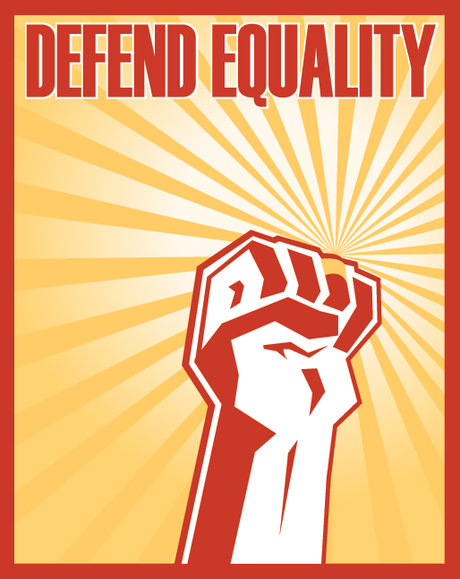A Rational Perspective on Equality
Posted: 19/04/2014 | Author: The Political Idealist | Filed under: Uncategorized | Tags: ban bossy, discrimination, equality, feminism, Labour party, Positive discrimination, sexism, social justice, women |Leave a commentMost societies, particularly in the West, have become more open and equal over the past century. Sometimes we forget just how much. The youth of today have grown up in a culture where, by and large, the concept of government or ‘respectable’ society discriminating against anybody on the grounds of their gender, ethnicity or sexual orientation is virtually unheard of. A whole generation has emerged to which the idea of a black President, or a woman CEO is entirely normal. It seems almost incomprehensible that things should ever have been different. In the UK, women are likely to be allowed to serve in the army on the frontline for the first time in history.
That fact is an indicator of how rapidly the world has moved forward in just a decade or so.
This is not to say that equality has been achieved: far from it. In the UK and the US, women are on average payed around one-fifth less than their male counterparts. Our culture has been polluted with a serious ‘pornification’ trend, with which advertisers and the media are complicit (how a disgusting book like Fifty Shades of Grey became an acceptable part of mainstream culture is beyond me). Meanwhile, homophobia and racism still exists in our schools and beyond. Gender stereotypes still impose roles on each gender, leading to unenlightened policies like the victimisation of Grayson Bruce, a North Carolina schoolboy who was banned from carrying a ‘My Little Pony’ lunchbox.
Work still needs to be done if we are to achieve total equality. Much of it is cultural, and cannot be legislated away. For example, the “Ban Bossy” campaign, which argues that the application of the word bossy to young girls discourages them from pursuing leadership roles in society, will only succeed if the public accept their message, not parliaments. In some countries, there have been moves to accelerate the advancement of historically disadvantaged groups through “affirmative action” or “positive discrimination”. In the UK, most positive discrimination policies exist to promote women (unlike the US, which often has measures to promote ethnic minorities).
In the Labour Party, we have All Woman Shortlists, which means that the leadership of the party has, since the 1990s, instructed a proportion of local Labour parties which have a ‘reasnoable’ chance of getting their prospective parliamentary candidate (PPC) elected that they can only select a woman as their PPC. The policy has been incredibly successful, with Labour a lot closer to attaining a gender balance in Parliament than other parties. Furthermore, in Young Labour, there are provisions that male candidates are excluded for key roles every other term.

At the risk of sounding controversial, I do not support positive discrimination. At least, not in general.
Discrimination is discrimination, and two wrongs do not make a right. I am a strong supporter of equality, and that means that everybody should have an equal chance. What positive discrimination means is that those groups who were not historically subject to discrimination now stand less chance than those who were. In Young Labour, a man can only stand for Chair in one out of every two terms, but a woman can stand in any term. I recall last year’s London Young Labour Conference, where there was vigorous competition for seats on the executive committee by the males, but any female who stood automatically won a seat because of the quota. That can’t be good for democracy.
If we believe in real fairness, we should be seeking balance rather than discrimination. For example, rather than imposing quotas for 40% of members of a company’s board to be women, as is being proposed by the European Union, why not require boards to comprise 50% women and 50% men. Some women object to quotas on the grounds that they want to win that promotion, or that seat on the committee on their own merit. They could hardly feel patronised by quotas if men were subject to the exact same rules.
I accept that my view is controversial, but I feel that equality cuts both ways. The only role positive discrimination has is at most a transitional one, until there is no need to artificially adjust each group’s prospects. As an ardent feminist, I think the fight for gender equality can only be considered truly won when there is no difference at all in how men and women are treated.

